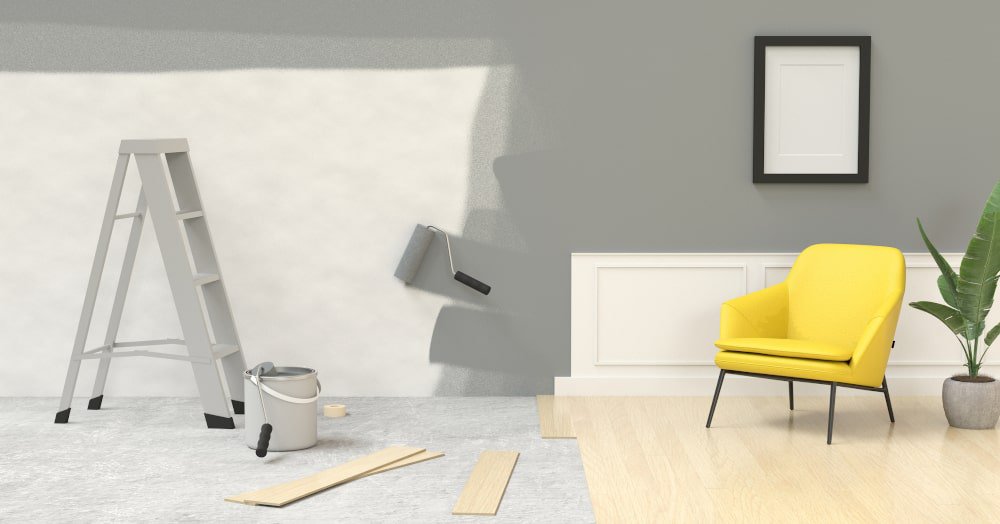Should You Sell Your Home “As Is” or Renovate It First?

If you are a Canadian looking to sell your home, you may be wondering how to best secure a profitable sale. Given the rapidly changing nature of the Canadian real estate market, especially in and around major city centres like Toronto and the GTA, it can be difficult to predict the best strategy to do so. Some homeowners opt to list their homes on the market “as-is,” while others prefer to complete value-enhancing renovations first. In this guide, we dive deeper into the logistics and potential advantages of each option to support you in making the best decision for you.
What is Selling a Home “As Is”?
When you sell your home “as-is,” you are listing it on the market without making any major renovations or changes beforehand. The home is advertised in its current condition, and there are no guarantees made about the need for future repairs. Homeowners may choose to sell their home “as-is” to avoid incurring renovation costs, or to ensure it gets listed and sold as quickly as possible. While this course of action can be a great option, there are a few key items to consider:
- Disclosure Requirements: while you are entitled to sell your house in its current condition, you may still be required to disclose any major defects to potential buyers. Before listing your home on the market, it may be a good idea to familiarize yourself with the disclosure requirements in your region, and adjusting your posting accordingly. An experienced real estate salesperson should be able to help you with this.
- Presentation: even if you decide to list your house “as-is,” it is recommended to at least clean it up, declutter, and ensure it is presentable for the open houses. You may want to consider staging a few rooms in the home , or perhaps even throwing on a quick coat of fresh paint. This can greatly improve your odds of securing a buyer with a more favourable offer.
- Price Negotiations: “as-is” properties often attract home renovators or flippers who are looking to maximize their ROI and make as much profit as possible. To do this, they will likely be looking to buy your property at the lowest price possible. You should prepare yourself for price negotiations based on the findings of any appraisals or inspections conducted by these potential buyers.
- Surrounding Homes: the perceived quality of your home will be affected by the other homes for sale in your area. If you live in an area where many homes are sold “as-is,” you may have an easier time securing a good sale price than if the other homes in your area are all renovated.
What is the Value of Renovating a Home?
In a seller’s market, homes are bought quickly—often following lengthy bidding wars. In such an environment, homeowners can get away with selling their homes “as-is” without sacrificing their ability to attract buyers. However, even in a hot real-estate market, renovating your home beforehand can greatly increase your home’s value, bringing you more significant profits.
Let us suppose, for instance, that the price of repairing a broken window is $3000. Many buyers would prefer buying a $805,000 home with intact windows over an $800,000 home with one broken window. This is because the convenience of not needing to make repairs often trumps the fiscal value of those repairs. With that in mind, how can you optimize the value of your home before listing it on the market?
- Make Repairs: before listing your home for sale, you may want to first conduct an internal inspection and make a note of any broken or defective areas of your home that may require repairs. Prospective buyers may not want to invest in homes that require extensive fixing or even minor repairs out of convenience.
- Re-vamp the Interior: coating your walls in a fresh coat of paint, replacing old carpeting, and deep cleaning your bathroom tiles are all examples of small interior fixes that can make a huge difference in the perceived quality of your home. By taking the time to get your current home in the best shape it can be, you may greatly increase its market value.
- Invest in High-ROI Renovations: if you are looking to take things a step further and implement more significant changes to your home, you may want to prioritize renovations with a historically high ROI . These repairs may include: replacing a steel front door, replacing old windows, upgrading kitchen countertops, adding a porch, replacing your flooring and more!
- Avoid Common Mistakes: some of the most common mistakes homeowners will make when renovating a home include: not setting a realistic budget, failing to obtain the required permits, not establishing a detailed timeline, hiring inexperienced contractors, prioritizing cost-effectiveness over quality/durability, and failing to effectively communicate their vision to contractors. By avoiding these common shortfalls, you can greatly increase your odds of success.
Factors to Consider When Making Your Decision
Ultimately, the decision to renovate, or not to renovate, will differ from person to person . However, there are a few key factors that can help guide your decision. Listing your home “as-is,” saves time and money, but may lead to a lower price at closing. Renovating your home may increase its value, but you run the risk of incurring too many costs for too little reward. Here are a few additional considerations to keep in mind:
-
Geography:
the location of your property will play a huge role in determining the profitability of conducting renovations. In an extremely hot market, the land your home sits on is likely worth more than the home itself. In these situations, it can be more profitable to sell your home “as-is,” there will be droves of buyers lining up regardless. If you live in a less active market, you may want to instead renovate your home in order to gain a competitive advantage in attracting buyers to your property.
-
Renovation Logistics:
while the idea of value-enhancing renovations can be appealing, it is important to remember that conducting home improvements can be a logistical nightmare. Depending on the type of renovations involved, you may need to secure temporary housing elsewhere while your contractions finish their work on your property.
-
Timeline Considerations:
are you just about to close the deal on a new home? Would selling your current home beforehand help you qualify for a better mortgage? In many cases, listing your property as soon as you can will be more beneficial to you than delaying the sale by months—even if sale value increases.
-
Tax Considerations of Renovating a Home:
when you sell a property, even your primary residence may be taxed in certain situations, for a price greater than what you bought it for, you may be subject to capital gains tax on the profits. By renovating your home, and increasing the sale price, you may be subject to additional capital gains taxes. On the other hand, home renovations might also considered a tax-deductible expense when selling a property. You will need to balance these considerations to decide which course of action is most profitable for you.
If you are interested in exploring your options further, your Clover Mortgage broker can help you gain perspective on the various opportunities available for your unique financial situation. Contact Clover Mortgage to book your free consultation today!
Resources





